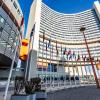
IIASA provided scientific input to the World Public Sector Report 2019, prepared by the Department of Economic and Social Affairs of the United Nations (UNDESA). The report focuses on the Sustainable Development Goal 16 on public institutions.
Nadejda Komendantova from the Advanced Systems Analysis (ASA) program of IIASA is a contributing author of the report.
The World Public Sector Report is one of UNDESA’s Flagship Reports and aims to capture the emerging issues, concerns and innovations in governance and public administration, especially those that contribute to the realization of the UN Development Agenda including the Sustainable Development Goals (SDGs).
This document is intended for policymakers, practitioners and civil society, particularly in developing countries and transition economies.
The report focuses on the Sustainable Development Goal 16 on public institutions. The 2030 Agenda and the Sustainable Development Goals (SDGs) prominently feature institutions, both as a cross-cutting issue in many of the goals and as a standalone goal (SDG 16). On risk management, the report finds that several emerging economies and developing countries have adopted innovative approaches, as they coordinate and integrate risk management strategies and decision-making processes horizontally across various ministries, departments and agencies, with some establishing cross-cutting commissions. IIASA contributed with results from the projects on participatory governance and stakeholders’ involvement including new institutional arrangements in risk management in public administration and application of e-governance tools, which facilitate participation, creation, and application of the all-hazards approaches to risk management of critical infrastructures such as electricity transmission grids, in particular. The contribution is based on results from the H2020 projects Matrix (New Multi-Hazard and Multi-Risk Assessment Methods), Co-Inform, and other projects.
The World Public Sector Report looks at national-level developments in relation to several concepts highlighted in the targets of Goal 16, which are viewed as institutional principles: access to information, transparency, accountability, anti-corruption, inclusiveness of decision-making processes, and non-discrimination. It aims to inform the first review of SDG 16 at the United Nations high-level political forum on sustainable development and to contribute to future efforts to monitor progress on SDG 16. By reviewing key challenges and opportunities for public institutions in the context of the implementation of the 2030 Agenda at the national level, the report also aims to inform efforts by all countries to create effective institutions to deliver the Sustainable Development Goals.
United Nations Department of Economic and Social Affairs (UNDESA)
The Department of Economic and Social Affairs of the United Nations Secretariat is a vital interface between global policies in the economic, social and environmental spheres of sustainable development and national action. Rooted in the United Nations Charter and guided by the transformative 2030 Agenda for Sustainable Development, the UN Department of Economic and Social Affairs upholds the development pillar of the United Nations. It brings the global community together to work towards common solutions to the world’s most pressing problems. It helps countries translate their global commitments into national action in the economic, social and environmental spheres.
News

06 February 2025
Rethinking energy demand can foster sustainable development and reduce emissions from buildings and transport

05 February 2025
Gender equality is crucial for a climate resilient future

16 December 2024
